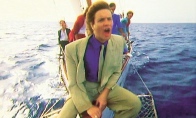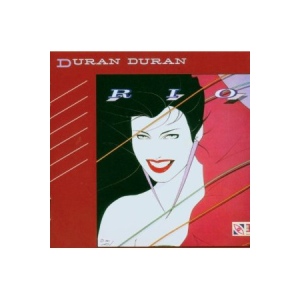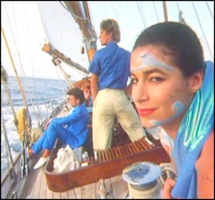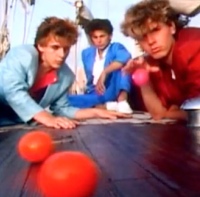- About Us
- Columns
- Letters
- Cartoons
- The Udder Limits
- Archives
- Ezy Reading Archive
- 2024 Cud Archives
- 2023 Cud Archives
- 2022 Cud Archives
- 2021 Cud Archives
- 2020 Cud Archives
- 2015-2019
- 2010-2014
- 2004-2009
 |
Ezy Reading: |
Three years ago while on a visit home to Australia to see my parents I was clearing through boxes of old papers when I found the long-forgotten review. I was surprised –and a little concerned- to note how little my clumsy handwriting had changed. Concerned, of course, because the yellowed piece of paper I’d just discovered was written when I was all of 9 years of age. Spelling errors and punctuation corrected for clarity, it read:
Duran Duran - Rio -1982 - Cassette tape
All songs written and arranged by Duran Duran
Produced by Colin Thurston
Everything is really, really good, especially ‘Rio’ and ‘Hungry Like The Wolf’.
‘My Own Way’ gets a bit annoying so don’t play it more than three times in a row.
‘Save A Prayer’ and ‘New Religion’ are quite sad but also good.
No.1 best song is ‘The Chauffeur’. It sounds like rain.
Remember to learn bass guitar like John Taylor and keyboards like Nick Rhodes.
This is a great tape. 9 out of 10.
Clearly I copied the first three lines of my ‘review’ directly from the album’s liner notes. I think it’s also safe to assume that at the time I had no clue of what a record producer did (if I was 9, then I probably hoped a producer might be the guy who cooked waffles whenever a band felt like it, because I remember thinking that it’d be really cool to have someone like that around at my beck and call). Nonetheless, I felt it important enough to make note of Thurston’s credit- and rightly so, he laid out a template with Rio that countless 80’s bands and producers later tried to replicate.
Nonetheless, I felt it important enough to make note of Thurston’s credit- and rightly so, he laid out a template with Rio that countless 80’s bands and producers later tried to replicate.
After the brief production notes, the remainder of what I wrote is pretty sparse. Fine, I was just a kid, but I’d like to think I could have done better than offering that ‘everything is really, really good.’ What deep-cut analysis! Nor was my incisive ‘quite sad but also good’ take on Save A Prayer and New Religion any better. A music-reviewing prodigy in the vein of Cameron Crowe I was not.
I decided to listen to My Own Way again for this article and, sure enough, it does perhaps get a tad annoying after being played three times in a row, though that could be said of any tune, right? Perhaps my assessment had more to do with the elusive poetry on offer from singer Simon Le Bon in the song:
Number one, public figure, what a pain
Just puts another rattle in your brain
Take another green but it’s not the same
So now you’re on the sand-lane everyday
Dancing with the bulls in any old way
Running like a fox to keep up with me
Those lyrics are a mystery to me now, let alone twenty-six years ago. What’s a fucking sand-lane? And who’s dancing with bulls? Are they running like a fox while dancing with the bulls or afterwards? And can I even function after they added a rattle to my brain? I’m so confused. Perhaps it’s best we just keep pressing on…
The most ridiculous part of my breakdown concerns The Chauffeur. The song was deemed my favourite on the album. Fine, I can live with that. It’s a dreamy, catchy example of New Wave pop that remains popular today, having been covered by such musicians as the Deftones, Korn’s Jonathan Davis and Australia’s Powderfinger. But to suggest that the song ‘sounds like rain’ kills me. Was this referring to the track specifically (which sounds nothing like rain) or merely a comment on what I could hear on the roof of the house while I was writing the ruddy review? Or, worse still, did I think that such a description –no matter how incomprehensible- sounded profound and added depth to what I had to say? I’m cringing either way, even as with lines like that one couldn’t fault me for laying the blame squarely on the influence of a certain aforementioned Mr. Le Bon.
But to suggest that the song ‘sounds like rain’ kills me. Was this referring to the track specifically (which sounds nothing like rain) or merely a comment on what I could hear on the roof of the house while I was writing the ruddy review? Or, worse still, did I think that such a description –no matter how incomprehensible- sounded profound and added depth to what I had to say? I’m cringing either way, even as with lines like that one couldn’t fault me for laying the blame squarely on the influence of a certain aforementioned Mr. Le Bon.
The last part of the text is perhaps a testament to the truth that lies within so many reviewers: deep down they all really want to be rock stars. Evidently I thought John Taylor and Nick Rhodes had a good gig going, otherwise I’d have focused on choosing lead vocals, lead guitar or drums as a future instrument instead. But this self-assuredness and preference to remain in the background and just focus on the music didn’t last. Within a year, on joining my first band, ‘The Moon Monkeys’, I had designated myself lead singer, much to the behest of the other four guys. The band lasted for one practice.
It’s curious that I decided to show a smidgen of fan restraint in awarding the album ‘9/10’ instead of a perfect rating. Rio was the first album I’d ever bought. I remember how much I genuinely enjoyed it and eagerly engaged in heated playground debates with other, often older students about why Duran Duran were infinitely better than the likes of Wham!, Spandau Ballet and the Thompson Twins. And I obviously felt moved enough about the music that I was compelled to write something down. Yet for whatever reason, when it came to a final grade, I deemed that Rio was just short of being perfect- but still ‘a great tape’.
By 1987, though, everything had changed. A week after starting at high school a twelfth grader on the bus handed me a copy of The Clash’s ‘London Calling’ that dramatically altered my tastes in music. Before too long I was lost in bands like Anthrax, Faith No More, and the Seattle grunge era which relegated New Wave music to a faint, forgotten memory. And even if I had remembered, it was unlikely I’d be caught out admitting to ‘a Duran Duran phase in my youth’ while taking in another Soundgarden or Mudhoney show.
Today, though, I look back on Rio with considerable nostalgic affection. Many now regard the album as having made an important contribution to 80’s music (and, in particular, New Wave music) history, something lost for years on those critics inclined to dismiss the band outright as little more than MTV fodder dressed in expensive suits. Contemporary musicians like the Strokes, Killers and Lostprophets haven’t just cited Duran Duran as a defining influence, they’ve even sought them out to produce their own work (in 2003 Nick Rhodes produced the Dandy Warhols album Welcome To The Monkey House).
But the point of all this isn’t to try and illustrate that at 9 I was so deeply connected to music that I identified something in an album that people wouldn’t truly appreciate for another quarter century. Far from it. Rather, I think that what I enjoy so much about this old scrap of paper on Rio is that it tells me just how much I’ve loved music in all its many forms for so very long. It also serves as a reminder of how subjective and varied tastes in music will always be from one individual to the next, and from one age to the next. It’s an obvious point, I suppose, but in an era of mass media bombarding us with thousands of opinions and reviews on anything and everything about music, and all those voices claiming to be better informed than the next, I find some comfort in the fact that I’m not, in my mind, any more qualified to review music now than when I was 9 years old.
Music that sounds good to me may be toxic to another individual’s ear and vice versa. But that’s just fine. Tastes change all the time, as do barometers of what’s ‘hip’ and ‘in’, something a few music journalists could do well to remember as they once again rubbish a particular band just because they don’t fit into their definition of ‘cool’. Time and perspective will always give what are arguably even the most savagely critiqued of bands another look that may well change on second glance. But who honestly knows what makes for good music anyway? I simply like the notion that something I enjoyed at 9 might eventually make its way back into my field of interest again.
It’s little surprise though. If a song was good enough to ‘sound like rain’ then it’s surely a keeper for the ages.
This article was first published in GasCan Magazine. Ezy Reading is out every month.
